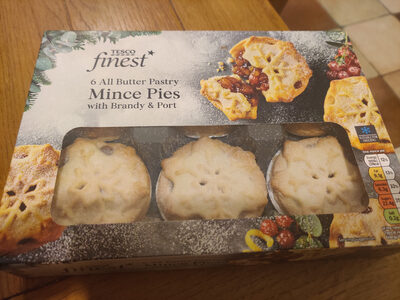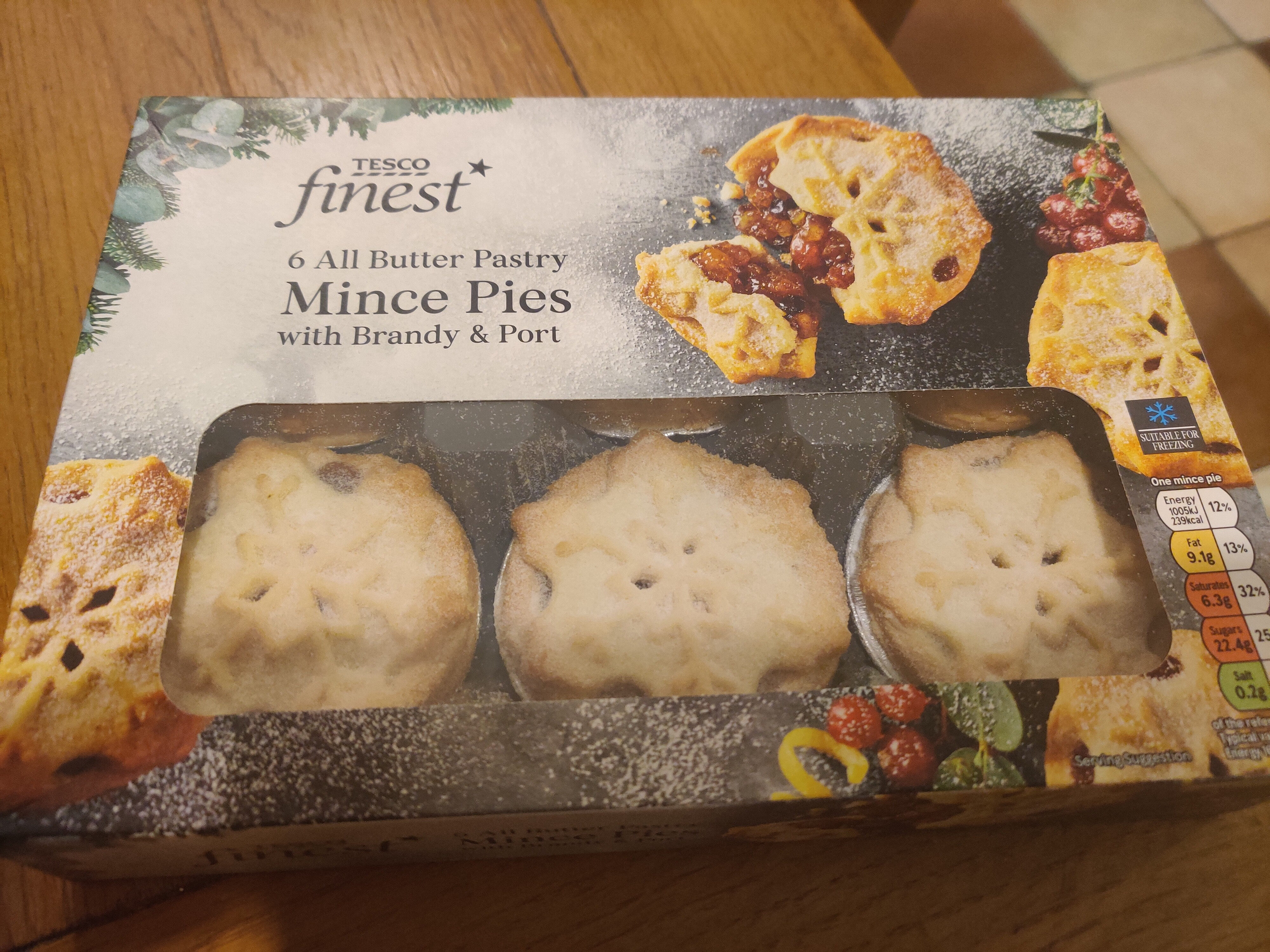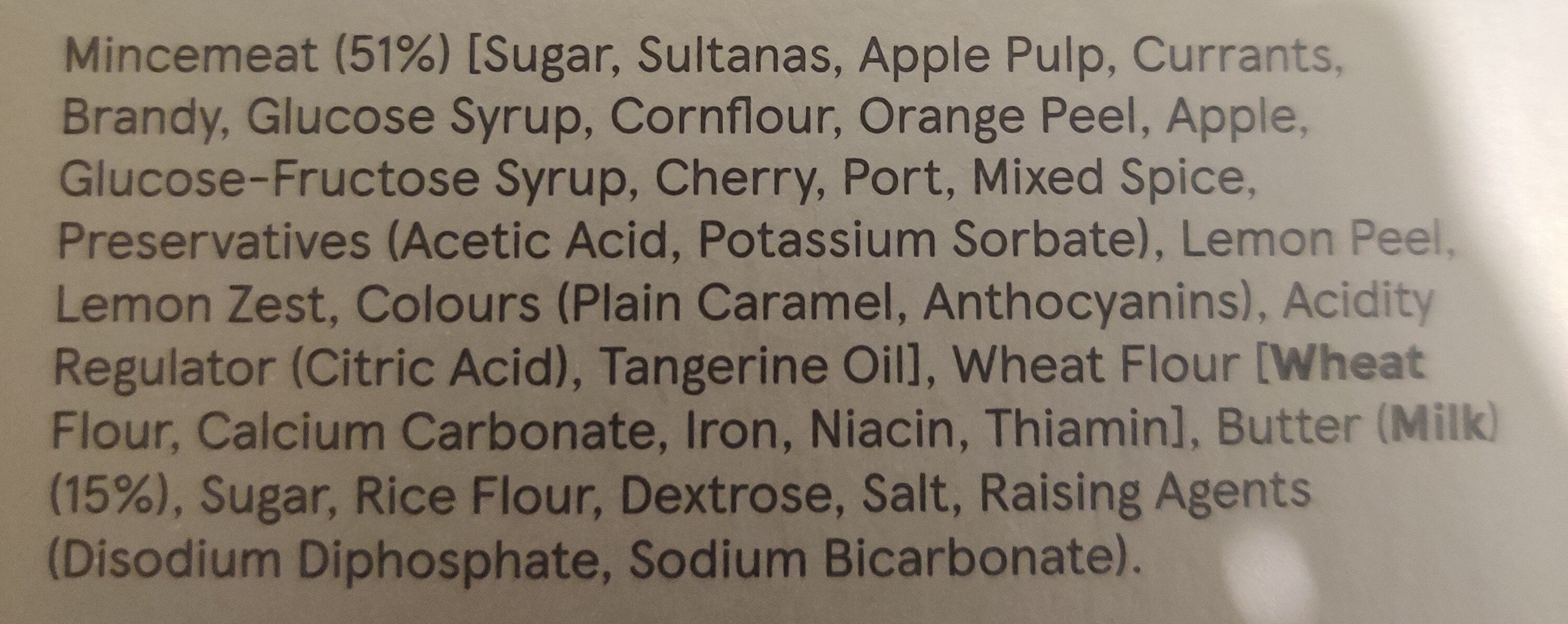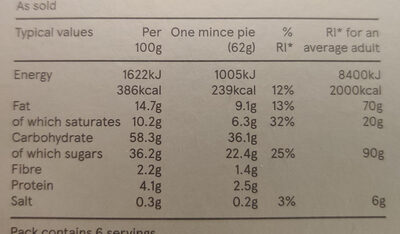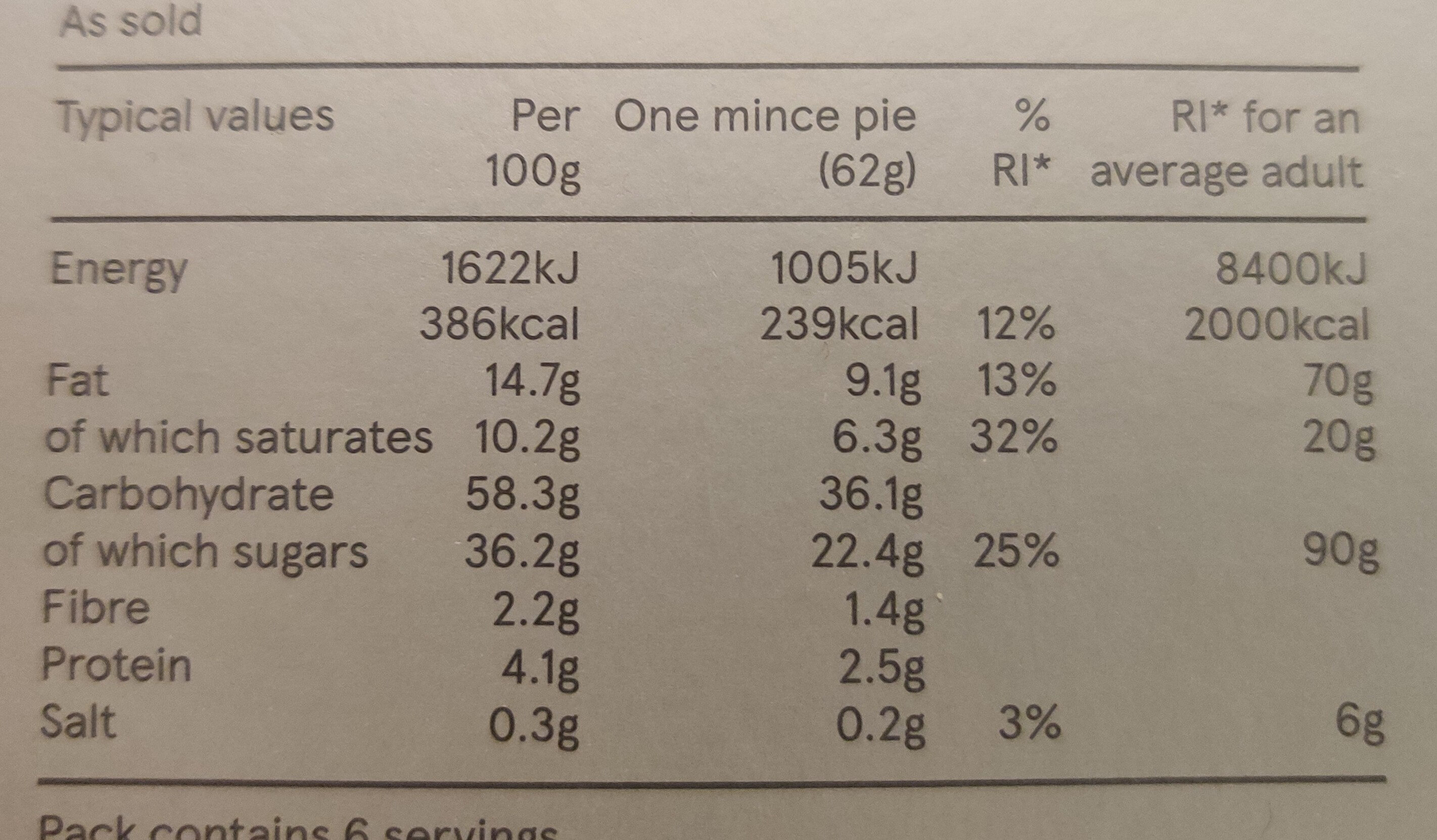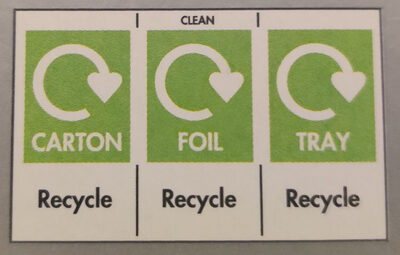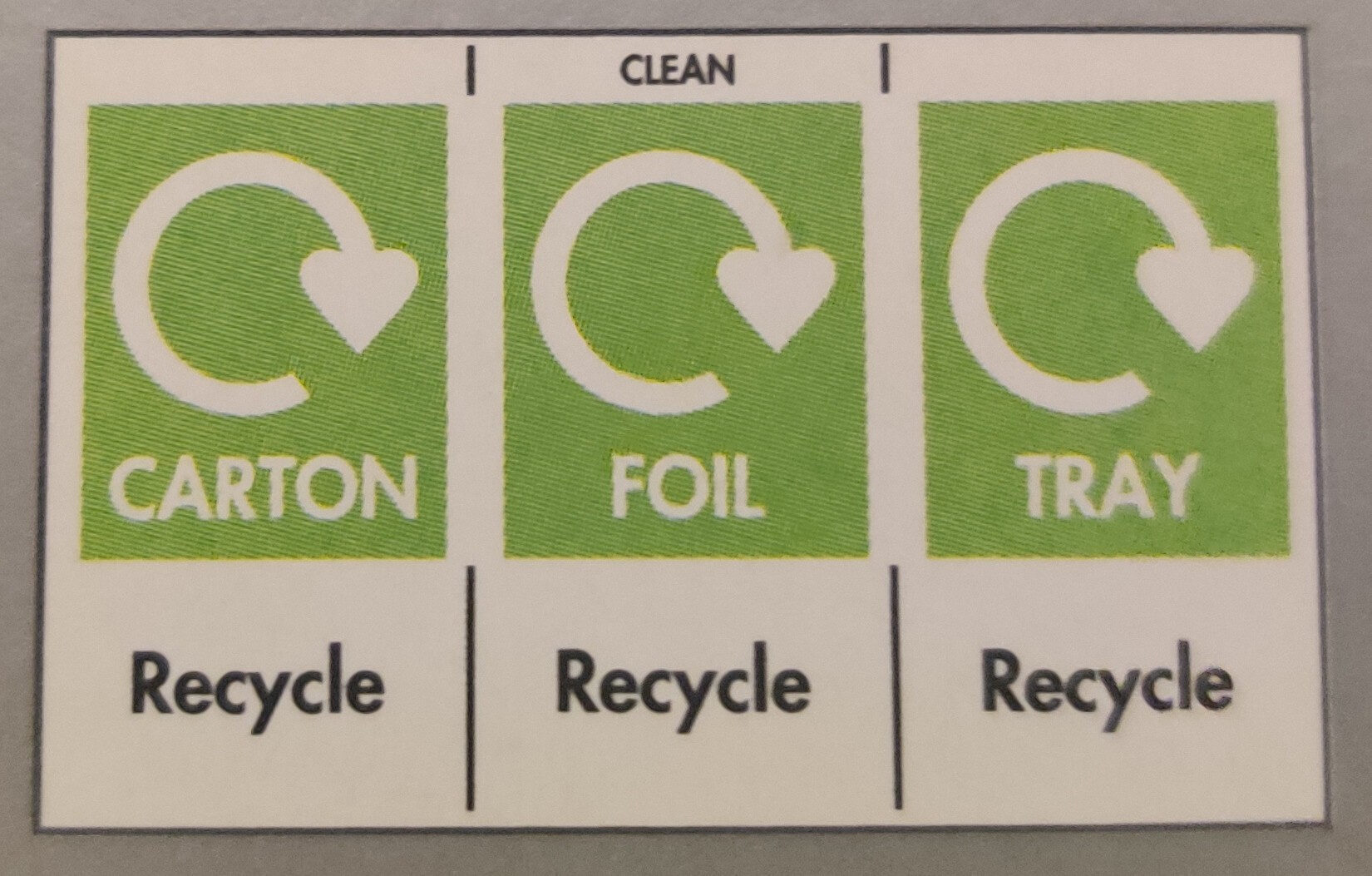Help us make food transparency the norm!
As a non-profit organization, we depend on your donations to continue informing consumers around the world about what they eat.
The food revolution starts with you!
All Butter Pastry Mince Pies with Brandy & Port - Tesco - 372g
All Butter Pastry Mince Pies with Brandy & Port - Tesco - 372g
This product page is not complete. You can help to complete it by editing it and adding more data from the photos we have, or by taking more photos using the app for Android or iPhone/iPad. Thank you!
×
Barcode: 5018374121035 (EAN / EAN-13)
Quantity: 372g
Packaging: Film, Tray, Card-box, Pet-film, Pet-tray
Brands: Tesco
Categories: Sweet pies, Pies
Labels, certifications, awards: Vegetarian, Suitable for freezing
Link to the product page on the official site of the producer: https://m.tesco.ie/mt/www.tesco.ie/groce...
Stores: Tesco
Countries where sold: France, Ireland, United Kingdom
Matching with your preferences
Health
Ingredients
-
39 ingredients
Mincemeat (51%) (Sugar, Sultanas, Apple Pulp, Currants, Brandy, Glucose Syrup, Cornflour, Orange Peel, Apple, Glucose-Fructose Syrup, Cherry, Port, Mixed Spice, Preservatives (Acetic Acid, Potassium Sorbate), Lemon Peel, Lemon Zest, Colours (Plain Caramel, Anthocyanins), Acidity Regulator (Citric Acid), Tangerine Oil), Wheat Flour (Wheat Flour, Calcium Carbonate, Iron, Niacin, Thiamin), Butter (Milk) (15%), Sugar, Rice Flour, Dextrose, Salt, Raising Agents (Disodium Diphosphate, Sodium Bicarbonate).Allergens: Apple, Gluten, MilkTraces: Nuts, Peanuts
Food processing
-
Ultra processed foods
Elements that indicate the product is in the 4 - Ultra processed food and drink products group:
- Additive: E150a - Plain caramel
- Additive: E163 - Anthocyanins
- Additive: E170 - Calcium carbonates
- Additive: E450 - Diphosphates
- Ingredient: Colour
- Ingredient: Dextrose
- Ingredient: Glucose
- Ingredient: Glucose syrup
Food products are classified into 4 groups according to their degree of processing:
- Unprocessed or minimally processed foods
- Processed culinary ingredients
- Processed foods
- Ultra processed foods
The determination of the group is based on the category of the product and on the ingredients it contains.
Additives
-
E163 - Anthocyanins
Anthocyanin: Anthocyanins -also anthocyans; from Greek: ἄνθος -anthos- "flower" and κυάνεος/κυανοῦς kyaneos/kyanous "dark blue"- are water-soluble vacuolar pigments that, depending on their pH, may appear red, purple, or blue. Food plants rich in anthocyanins include the blueberry, raspberry, black rice, and black soybean, among many others that are red, blue, purple, or black. Some of the colors of autumn leaves are derived from anthocyanins.Anthocyanins belong to a parent class of molecules called flavonoids synthesized via the phenylpropanoid pathway. They occur in all tissues of higher plants, including leaves, stems, roots, flowers, and fruits. Anthocyanins are derived from anthocyanidins by adding sugars. They are odorless and moderately astringent. Although approved to color foods and beverages in the European Union, anthocyanins are not approved for use as a food additive because they have not been verified as safe when used as food or supplement ingredients. There is no conclusive evidence anthocyanins have any effect on human biology or diseases.Source: Wikipedia
-
E170 - Calcium carbonates
Calcium carbonate: Calcium carbonate is a chemical compound with the formula CaCO3. It is a common substance found in rocks as the minerals calcite and aragonite -most notably as limestone, which is a type of sedimentary rock consisting mainly of calcite- and is the main component of pearls and the shells of marine organisms, snails, and eggs. Calcium carbonate is the active ingredient in agricultural lime and is created when calcium ions in hard water react with carbonate ions to create limescale. It is medicinally used as a calcium supplement or as an antacid, but excessive consumption can be hazardous.Source: Wikipedia
-
E202 - Potassium sorbate
Potassium sorbate (E202) is a synthetic food preservative commonly used to extend the shelf life of various food products.
It works by inhibiting the growth of molds, yeast, and some bacteria, preventing spoilage. When added to foods, it helps maintain their freshness and quality.
Some studies have shown that when combined with nitrites, potassium sorbate have genotoxic activity in vitro. However, potassium sorbate is generally recognized as safe (GRAS) by regulatory authorities.
-
E260 - Acetic acid
Acetic acid: Acetic acid , systematically named ethanoic acid , is a colorless liquid organic compound with the chemical formula CH3COOH -also written as CH3CO2H or C2H4O2-. When undiluted, it is sometimes called glacial acetic acid. Vinegar is no less than 4% acetic acid by volume, making acetic acid the main component of vinegar apart from water. Acetic acid has a distinctive sour taste and pungent smell. In addition to household vinegar, it is mainly produced as a precursor to polyvinyl acetate and cellulose acetate. It is classified as a weak acid since it only partially dissociates in solution, but concentrated acetic acid is corrosive and can attack the skin. Acetic acid is the second simplest carboxylic acid -after formic acid-. It consists of a methyl group attached to a carboxyl group. It is an important chemical reagent and industrial chemical, used primarily in the production of cellulose acetate for photographic film, polyvinyl acetate for wood glue, and synthetic fibres and fabrics. In households, diluted acetic acid is often used in descaling agents. In the food industry, acetic acid is controlled by the food additive code E260 as an acidity regulator and as a condiment. In biochemistry, the acetyl group, derived from acetic acid, is fundamental to all forms of life. When bound to coenzyme A, it is central to the metabolism of carbohydrates and fats. The global demand for acetic acid is about 6.5 million metric tons per year -Mt/a-, of which approximately 1.5 Mt/a is met by recycling; the remainder is manufactured from methanol. Vinegar is mostly dilute acetic acid, often produced by fermentation and subsequent oxidation of ethanol.Source: Wikipedia
-
E330 - Citric acid
Citric acid is a natural organic acid found in citrus fruits such as lemons, oranges, and limes.
It is widely used in the food industry as a flavor enhancer, acidulant, and preservative due to its tart and refreshing taste.
Citric acid is safe for consumption when used in moderation and is considered a generally recognized as safe (GRAS) food additive by regulatory agencies worldwide.
-
E450 - Diphosphates
Diphosphates (E450) are food additives often utilized to modify the texture of products, acting as leavening agents in baking and preventing the coagulation of canned food.
These salts can stabilize whipped cream and are also found in powdered products to maintain their flow properties. They are commonly present in baked goods, processed meats, and soft drinks.
Derived from phosphoric acid, they're part of our daily phosphate intake, which often surpasses recommended levels due to the prevalence of phosphates in processed foods and drinks.
Excessive phosphate consumption is linked to health issues, such as impaired kidney function and weakened bone health. Though diphosphates are generally regarded as safe when consumed within established acceptable daily intakes, it's imperative to monitor overall phosphate consumption to maintain optimal health.
-
E500 - Sodium carbonates
Sodium carbonates (E500) are compounds commonly used in food preparation as leavening agents, helping baked goods rise by releasing carbon dioxide when they interact with acids.
Often found in baking soda, they regulate the pH of food, preventing it from becoming too acidic or too alkaline. In the culinary world, sodium carbonates can also enhance the texture and structure of foods, such as noodles, by modifying the gluten network.
Generally recognized as safe, sodium carbonates are non-toxic when consumed in typical amounts found in food.
-
E500ii - Sodium hydrogen carbonate
Sodium hydrogen carbonate, also known as E500ii, is a food additive commonly used as a leavening agent.
When added to recipes, it releases carbon dioxide gas upon exposure to heat or acids, causing dough to rise and resulting in a light, fluffy texture in baked goods.
It is generally recognized as safe (GRAS) by regulatory authorities when used in appropriate quantities and poses no significant health risks when consumed in typical food applications.
Ingredients analysis
-
Palm oil free
No ingredients containing palm oil detected
Unrecognized ingredients: Mincemeat, CurrantsSome ingredients could not be recognized.
We need your help!
You can help us recognize more ingredients and better analyze the list of ingredients for this product and others:
- Edit this product page to correct spelling mistakes in the ingredients list, and/or to remove ingredients in other languages and sentences that are not related to the ingredients.
- Add new entries, synonyms or translations to our multilingual lists of ingredients, ingredient processing methods, and labels.
If you would like to help, join the #ingredients channel on our Slack discussion space and/or learn about ingredients analysis on our wiki. Thank you!
-
Non-vegan
Non-vegan ingredients: ButterSome ingredients could not be recognized.
We need your help!
You can help us recognize more ingredients and better analyze the list of ingredients for this product and others:
- Edit this product page to correct spelling mistakes in the ingredients list, and/or to remove ingredients in other languages and sentences that are not related to the ingredients.
- Add new entries, synonyms or translations to our multilingual lists of ingredients, ingredient processing methods, and labels.
If you would like to help, join the #ingredients channel on our Slack discussion space and/or learn about ingredients analysis on our wiki. Thank you!
-
Vegetarian
No non-vegetarian ingredients detected
Unrecognized ingredients: Mincemeat, Currants, Iron, ThiaminSome ingredients could not be recognized.
We need your help!
You can help us recognize more ingredients and better analyze the list of ingredients for this product and others:
- Edit this product page to correct spelling mistakes in the ingredients list, and/or to remove ingredients in other languages and sentences that are not related to the ingredients.
- Add new entries, synonyms or translations to our multilingual lists of ingredients, ingredient processing methods, and labels.
If you would like to help, join the #ingredients channel on our Slack discussion space and/or learn about ingredients analysis on our wiki. Thank you!
-
Details of the analysis of the ingredients
We need your help!
Some ingredients could not be recognized.
We need your help!
You can help us recognize more ingredients and better analyze the list of ingredients for this product and others:
- Edit this product page to correct spelling mistakes in the ingredients list, and/or to remove ingredients in other languages and sentences that are not related to the ingredients.
- Add new entries, synonyms or translations to our multilingual lists of ingredients, ingredient processing methods, and labels.
If you would like to help, join the #ingredients channel on our Slack discussion space and/or learn about ingredients analysis on our wiki. Thank you!
: Mincemeat 51% (Sugar, Sultanas, Apple Pulp, Currants, Brandy, Glucose Syrup, Cornflour, Orange Peel, Apple, Glucose-Fructose Syrup, Cherry, Port, Mixed Spice, Preservatives (Acetic Acid, Potassium Sorbate), Lemon Peel, Lemon Zest, Colours (Plain Caramel, Anthocyanins), Acidity Regulator (Citric Acid), Tangerine Oil), Wheat Flour (_Wheat_ Flour, Calcium Carbonate, Iron, Niacin, Thiamin), Butter, Sugar, Rice Flour, Dextrose, Salt, Raising Agents (Disodium Diphosphate, Sodium Bicarbonate)- Mincemeat -> en:mincemeat - percent_min: 51 - percent: 51 - percent_max: 51
- Sugar -> en:sugar - vegan: yes - vegetarian: yes - ciqual_proxy_food_code: 31016 - percent_min: 2.68421052631579 - percent_max: 36.2
- Sultanas -> en:sultana - vegan: yes - vegetarian: yes - ciqual_food_code: 13112 - percent_min: 0.822222222222222 - percent_max: 25.5
- Apple Pulp -> en:apple-pulp - vegan: yes - vegetarian: yes - ciqual_food_code: 13050 - percent_min: 0 - percent_max: 17
- Currants -> en:currants - percent_min: 0 - percent_max: 12.75
- Brandy -> en:brandy - vegan: maybe - vegetarian: yes - ciqual_food_code: 1014 - percent_min: 0 - percent_max: 10.2
- Glucose Syrup -> en:glucose-syrup - vegan: yes - vegetarian: yes - ciqual_proxy_food_code: 31016 - percent_min: 0 - percent_max: 8.5
- Cornflour -> en:corn-flour - vegan: yes - vegetarian: yes - ciqual_food_code: 9545 - percent_min: 0 - percent_max: 7.28571428571429
- Orange Peel -> en:orange-zest - vegan: yes - vegetarian: yes - ciqual_proxy_food_code: 13034 - percent_min: 0 - percent_max: 6.375
- Apple -> en:apple - vegan: yes - vegetarian: yes - ciqual_food_code: 13050 - percent_min: 0 - percent_max: 5.66666666666667
- Glucose-Fructose Syrup -> en:glucose-fructose-syrup - vegan: yes - vegetarian: yes - ciqual_food_code: 31077 - percent_min: 0 - percent_max: 5.1
- Cherry -> en:cherry - vegan: yes - vegetarian: yes - ciqual_food_code: 13008 - percent_min: 0 - percent_max: 4.63636363636364
- Port -> en:port - vegan: maybe - vegetarian: yes - ciqual_food_code: 1014 - percent_min: 0 - percent_max: 4.25
- Mixed Spice -> en:mixed-spices - vegan: yes - vegetarian: yes - percent_min: 0 - percent_max: 3.92307692307692
- Preservatives -> en:preservative - percent_min: 0 - percent_max: 3.64285714285714
- Acetic Acid -> en:e260 - vegan: yes - vegetarian: yes - percent_min: 0 - percent_max: 3.64285714285714
- Potassium Sorbate -> en:e202 - vegan: yes - vegetarian: yes - percent_min: 0 - percent_max: 1.82142857142857
- Lemon Peel -> en:lemon-peel - vegan: yes - vegetarian: yes - ciqual_proxy_food_code: 13009 - percent_min: 0 - percent_max: 3.4
- Lemon Zest -> en:lemon-zest - vegan: yes - vegetarian: yes - ciqual_food_code: 13125 - percent_min: 0 - percent_max: 3.1875
- Colours -> en:colour - percent_min: 0 - percent_max: 3
- Plain Caramel -> en:e150a - vegan: yes - vegetarian: yes - percent_min: 0 - percent_max: 3
- Anthocyanins -> en:e163 - vegan: yes - vegetarian: yes - percent_min: 0 - percent_max: 1.5
- Acidity Regulator -> en:acidity-regulator - percent_min: 0 - percent_max: 2.83333333333333
- Citric Acid -> en:e330 - vegan: yes - vegetarian: yes - percent_min: 0 - percent_max: 2.83333333333333
- Tangerine Oil -> en:tangerine-oil - vegan: yes - vegetarian: yes - percent_min: 0 - percent_max: 2.68421052631579
- Wheat Flour -> en:wheat-flour - vegan: yes - vegetarian: yes - ciqual_proxy_food_code: 9410 - percent_min: 7 - percent_max: 49
- _Wheat_ Flour -> en:wheat-flour - vegan: yes - vegetarian: yes - ciqual_proxy_food_code: 9410 - percent_min: 1.4 - percent_max: 49
- Calcium Carbonate -> en:e170i - vegan: maybe - vegetarian: maybe - percent_min: 0 - percent_max: 24.5
- Iron -> en:iron - percent_min: 0 - percent_max: 16.3333333333333
- Niacin -> en:e375 - vegan: maybe - vegetarian: maybe - percent_min: 0 - percent_max: 12.25
- Thiamin -> en:thiamin - percent_min: 0 - percent_max: 9.8
- Butter -> en:butter - vegan: no - vegetarian: yes - ciqual_proxy_food_code: 16400 - percent_min: 0 - percent_max: 33.3333333333333
- Sugar -> en:sugar - vegan: yes - vegetarian: yes - ciqual_proxy_food_code: 31016 - percent_min: 0 - percent_max: 21
- Rice Flour -> en:rice-flour - vegan: yes - vegetarian: yes - ciqual_food_code: 9520 - percent_min: 0 - percent_max: 14
- Dextrose -> en:dextrose - vegan: yes - vegetarian: yes - ciqual_proxy_food_code: 31016 - percent_min: 0 - percent_max: 10.5
- Salt -> en:salt - vegan: yes - vegetarian: yes - ciqual_food_code: 11058 - percent_min: 0 - percent_max: 0.3
- Raising Agents -> en:raising-agent - percent_min: 0 - percent_max: 0.3
- Disodium Diphosphate -> en:e450i - vegan: yes - vegetarian: yes - percent_min: 0 - percent_max: 0.3
- Sodium Bicarbonate -> en:e500ii - vegan: yes - vegetarian: yes - percent_min: 0 - percent_max: 0.15
Nutrition
-
Bad nutritional quality
⚠ ️Warning: the amount of fruits, vegetables and nuts is not specified on the label, it was estimated from the list of ingredients: 22This product is not considered a beverage for the calculation of the Nutri-Score.
Positive points: 2
- Proteins: 2 / 5 (value: 4.1, rounded value: 4.1)
- Fiber: 2 / 5 (value: 2.2, rounded value: 2.2)
- Fruits, vegetables, nuts, and colza/walnut/olive oils: 0 / 5 (value: 22.1676084908826, rounded value: 22.2)
Negative points: 23
- Energy: 4 / 10 (value: 1622, rounded value: 1622)
- Sugars: 8 / 10 (value: 36.2, rounded value: 36.2)
- Saturated fat: 10 / 10 (value: 10.2, rounded value: 10.2)
- Sodium: 1 / 10 (value: 120, rounded value: 120)
The points for proteins are not counted because the negative points are greater or equal to 11.
Nutritional score: (23 - 2)
Nutri-Score:
-
Nutrient levels
-
Fat in moderate quantity (14.7%)
What you need to know- A high consumption of fat, especially saturated fats, can raise cholesterol, which increases the risk of heart diseases.
Recommendation: Limit the consumption of fat and saturated fat- Choose products with lower fat and saturated fat content.
-
Saturated fat in high quantity (10.2%)
What you need to know- A high consumption of fat, especially saturated fats, can raise cholesterol, which increases the risk of heart diseases.
Recommendation: Limit the consumption of fat and saturated fat- Choose products with lower fat and saturated fat content.
-
Sugars in high quantity (36.2%)
What you need to know- A high consumption of sugar can cause weight gain and tooth decay. It also augments the risk of type 2 diabetes and cardio-vascular diseases.
Recommendation: Limit the consumption of sugar and sugary drinks- Sugary drinks (such as sodas, fruit beverages, and fruit juices and nectars) should be limited as much as possible (no more than 1 glass a day).
- Choose products with lower sugar content and reduce the consumption of products with added sugars.
-
Salt in moderate quantity (0.3%)
What you need to know- A high consumption of salt (or sodium) can cause raised blood pressure, which can increase the risk of heart disease and stroke.
- Many people who have high blood pressure do not know it, as there are often no symptoms.
- Most people consume too much salt (on average 9 to 12 grams per day), around twice the recommended maximum level of intake.
Recommendation: Limit the consumption of salt and salted food- Reduce the quantity of salt used when cooking, and don't salt again at the table.
- Limit the consumption of salty snacks and choose products with lower salt content.
-
-
Nutrition facts
Nutrition facts As sold
for 100 g / 100 mlAs sold
per serving (62g)Compared to: Sweet pies Energy 1,622 kj
(386 kcal)1,010 kj
(239 kcal)+21% Fat 14.7 g 9.11 g +11% Saturated fat 10.2 g 6.32 g +40% Carbohydrates 58.3 g 36.1 g +30% Sugars 36.2 g 22.4 g +38% Fiber 2.2 g 1.36 g Proteins 4.1 g 2.54 g -2% Salt 0.3 g 0.186 g Fruits‚ vegetables‚ nuts and rapeseed‚ walnut and olive oils (estimate from ingredients list analysis) 22.168 % 22.168 %
Environment
-
Eco-Score not computed - Unknown environmental impact
We could not compute the Eco-Score of this product as it is missing some data, could you help complete it?Could you add a precise product category so that we can compute the Eco-Score? Add a category
Packaging
-
Packaging with a high impact
-
Packaging parts
Box
Film (PET 1 - Polyethylene terephthalate)
Tray (PET 1 - Polyethylene terephthalate)
-
Packaging materials
Material % Packaging weight Packaging weight per 100 g of product Plastic
-
Transportation
-
Origins of ingredients
Missing origins of ingredients information
⚠ ️ The origins of the ingredients of this product are not indicated.
If they are indicated on the packaging, you can modify the product sheet and add them.
If you are the manufacturer of this product, you can send us the information with our free platform for producers.Add the origins of ingredients for this product Add the origins of ingredients for this product
Report a problem
-
Incomplete or incorrect information?
Category, labels, ingredients, allergens, nutritional information, photos etc.
If the information does not match the information on the packaging, please complete or correct it. Open Food Facts is a collaborative database, and every contribution is useful for all.
Data sources
Product added on by kiliweb
Last edit of product page on by packbot.
Product page also edited by gdude2002, inf, openfoodfacts-contributors, swipe-studio, teolemon, yuka.YS9zTVAvZ2svdndWa2YxbTJUeUY0TnRYK2JHNFhEaXFKN2RQSVE9PQ.
